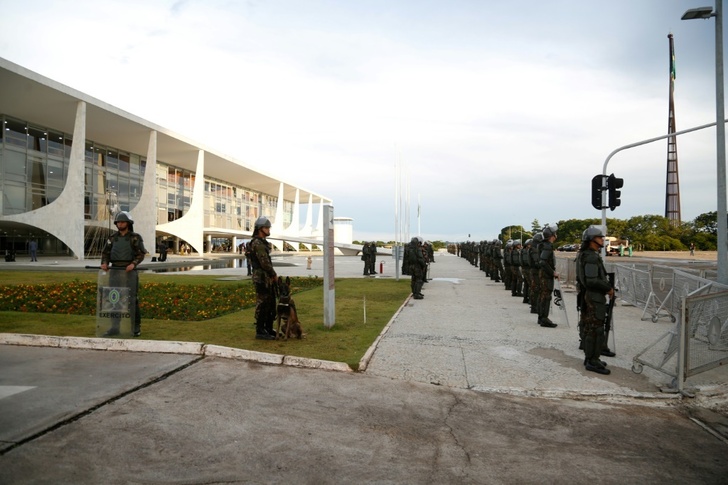Brazil's democracy has withstood a vicious initial assault by die-hard backers of vanquished far-right ex-president Jair Bolsonaro who on Sunday sacked the symbolic seats of a government since recently in leftist hands.
With the military resisting rioters' calls for a coup against recently inaugurated President Luiz Inacio Lula da Silva and lawmakers and governors from all political persuasions rallying to his side, the center held.
Then, on Wednesday, calls for a renewed "mega" mobilization countrywide to "take back power" went completely unheeded -- suggesting the so-called "bolsonaristas" may find themselves weakened.
But observers and analysts say the threat has not passed.
A massive roundup of hundreds of suspected rioters and the dismissal of senior government figures suspected of collusion with them, may simply have discouraged people from going onto the streets so soon after a violent event that deeply shocked even some Bolsonaro voters.

"The country is still bitterly polarized and I don't think the no-show of the 'bolsonaristas' less than a week after January 8th should be interpreted as somehow the country has come together in defense of democracy."
- 'Pro-coup sentiment' -
Some 58 million out of 156 million eligible voters opted for Bolsonaro in October elections that Lula won by a razor-thin margin after a visceral and deeply divisive campaign that pitted loved ones and colleagues against each other.
Millions deeply despise ultra-conservative "beef, bibles and bullets" Bolsonaro for perceived bigotry, his handling of the Covid-19 pandemic, and heedless environmental destruction, among other things.

Many also believe widespread disinformation -- often promoted by Bolsonaro himself -- that the election was rigged and Lula an illegitimate leader with plans to turn Brazil into a Venezuela-style "communist" state.
"The fact that Bolsonaro lost his re-election bid with 58 million votes -- and by the narrowest margin in Brazil’s democratic history -– speaks volumes about the underlying potential for disruption," said Mariano Machado, Principal Americas analyst at risk intelligence company Verisk Maplecroft.
"The pro-coup sentiment doesn’t have the majority, but is by no means residual," he told AFP.
- 'A warning' -
Lula himself said Thursday that the storming of the presidential palace, Congress and Supreme Court, "was a warning, a very big warning that we have to be more careful."
"We won an election by defeating Bolsonaro, but 'bolsonarismo' is there and fanatical 'bolsonarismo' is a very difficult thing because it does not respect anyone."
Lula said he suspected the rioters, who invaded government buildings and left them severely damaged, had inside help, including from "conniving" police and armed forces members.
Bolsonaro, who never conceded Lula's victory and had suggested in the lead-up to elections that he might not accept defeat, has condemned Sunday's events.
But his efforts to sow doubts on the country's electoral system left millions with suspicions over the reliability of the outcome, and fearful of Lula and the left.
Analyst Guilherme Casaroes of the Getulio Vargas Foundation, said the Lula government's response: mass arrests, a significant security boost and charging rioters with "terrorism," may well deter some in the Bolsonaro camp from causing further trouble.

A majority, however, are likely to "return to their homes hoping to elect Bolsonaro in 2026 or, as is happening in the United States, migrate to a more moderate leadership."
One potential risk is turning Bolsonaro into a martyr by ordering his arrest, for example, or his extradition from the United States where he has recently received medical care.
Sociologist Geraldo Monteiro, who cowrote a book on "bolsonarismo," said the movement did not have sufficient "organization for a counteroffensive."
Many of Bolsonaro's backers are also abandoning him.
"The vast majority (of 'bolsonaristas') are ordinary people, they are not cut out for a fight... This movement does not have the necessary experience to move forward," he told AFP.
For Shifter, however, "this movement is still around" and Brazil should expect "more low intensity... upheavals and protests and some violence. I don't think that is going to disappear."
Many were taking a "wait and see" approach to what will happen with Bolsonaro.
"That doesn't mean that they've decided that the fight is no longer worth waging."
Especially for the hard-core supporters, "I think... the fight goes on. They'll fight another day."
bur-mlr/tjj
© Agence France-Presse
Your content is great. However, if any of the content contained herein violates any rights of yours, including those of copyright, please contact us immediately by e-mail at media[@]kissrpr.com.
Source: Story.KISSPR.com

